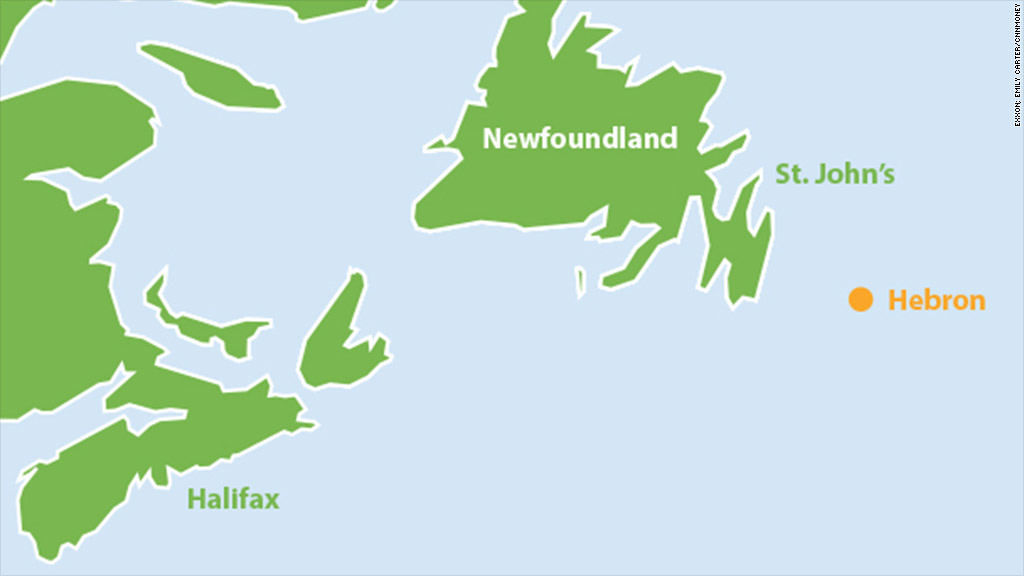
Two hundred miles southeast of Newfoundland, not far from where the Titanic sank, ExxonMobil is spending $14 billion to drill one of the biggest oil fields in the North Atlantic.
Seeing Exxon develop oil fields for Canada is reviving calls for the United States to do the same off its Atlantic Coast -- which has been closed for oil and gas exploration for decades.
But as Shell's (RDSA) drill ships continue to run aground in the Arctic, critics say letting Exxon drill off the coast of Newfoundland or the heavily populated U.S. Eastern Seaboard is a mistake.
The risks: In 1982, the Ocean Ranger -- then the largest drill rig of its type in the world -- capsized and sank in nearby waters during a winter storm, killing all 84 crew members aboard.
Safety standards have improved since then, but drilling in icy, remote conditions remains one of the most dangerous jobs in the businesses -- as Royal Dutch Shell's ill-fated Arctic foray showed last summer.
To tap this new oil field, Exxon (XOM) and its partners are constructing a massive platform that will sit on the ocean floor and rise more than 300 feet to the surface, then an additional 300 feet above the water. The structure is almost as tall as the Eiffel Tower, and weighs more than twice as much as the Empire State Building. Full funding for its construction was announced earlier this month.
The platform is being built in a dammed off inlet near St. John, Newfoundland. Once completed, the inlet will be flooded, and the platform floated to sea.
Related: California could be next oil boom state
It's not the first time this inlet has been used for such an undertaking. In the 1990s Exxon constructed a similar platform here for a field nearby. That's partly why Exxon thinks it can safely produce the field, known as Hebron, which is thought to contain up to a billion barrels of oil.
"We've been operating in the Arctic for decades," said company spokesman Alan Jeffers, noting Exxon's experience off Russia's Sakhalin Island. "The more you do it, the more you learn."
One of the things the company has learned, said Jeffers, is how to keep icebergs away. Exxon has extensively mapped the currents in the region, he said, and employs an iceberg monitoring system to avert the bergs. This is done either using the propeller wash from ships, or actually lassoing the iceberg with cables and towing it out of the way -- a practice that's led to the term "iceberg cowboy."
And unlike the Alaska locale of Shell's Arctic expedition, the Canadian waters are much closer to ports, ships and other infrastructure that could be used in an emergency.
Jeffers is confident Exxon can get the job done safely, and says there's no reason to think the oil found off the coast of Canada doesn't extend down to the United States as well.
"We haven't looked since the Nixon Administration," he said.
U.S. exploration: That's changing. While the Obama administration has not opened U.S. Atlantic waters to drilling, it is looking at the environmental impacts of seismic testing to gauge the size of any oil or gas deposits. The results of the study are expected this year, and permits for seismic testing could be issued in the later half of 2013, an Interior Department spokesman said.
For some, it couldn't come soon enough.

"Other countries are not letting the grass grow under their feet when it comes to offshore energy development," said Dan Kish, policy director for the Institute for Energy Research, an organization that's long called for more domestic drilling and is partly funded by the industry. "That's in sharp contrast to American policy."
Kish downplays the danger of a spill, saying oil naturally leaks into the ocean every day anyway, and the benefits of more jobs and more domestic energy far outweigh the risks. Renewables would be nice, he said, but simply aren't capable of producing the amount of energy the world needs.
Others disagree, and say comparing the slow seep of naturally occurring oil leaks is a far cry from a major blowout that could cripple the fishing and tourism industries of coastal states.
They say the fact that the industry has to go to ever more remote and risky places is proof that the time for more renewables and conservation is now.
"The benefits go to the companies, but the risks go to the people," said Mike Lavine, a lawyer for Oceana, a marine-focused environmental group. "We shouldn't be asked to bear those risks for the sake of corporate profit."


